Key takeaways:
- Audiovisual expos provide networking opportunities and showcase innovative technology, inspiring collaboration among professionals.
- Cross-industry collaboration fosters creative solutions and enhances understanding of various challenges, promoting innovation.
- Workshops emphasize hands-on learning and experimentation, allowing participants to gain practical skills and make valuable connections.
- Preparation, active participation, and post-workshop follow-up are essential for maximizing the benefits of workshop experiences.
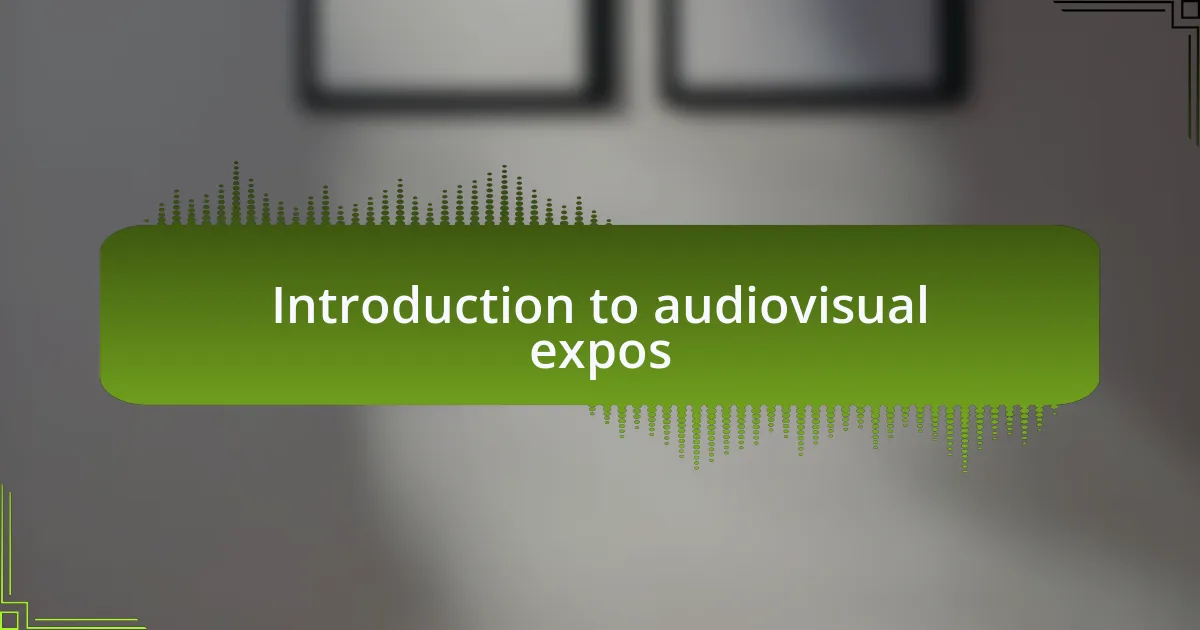
Introduction to audiovisual expos
Audiovisual expos are vibrant gatherings that showcase the latest innovations in sound and visual technology. It’s where industry professionals, creators, and enthusiasts converge to share ideas and spark collaborations. I remember my first experience at such an event; the energy was infectious, and I couldn’t help but wonder, what groundbreaking concepts were waiting to be discovered?
At these expos, you’ll often find cutting-edge equipment and techniques that can transform how we perceive media. I still recall seeing a live demonstration of immersive audio technology that made my heart race with excitement. How often do we get to witness such advancements in real-time, engaging all our senses?
These events also provide invaluable networking opportunities. Connecting with like-minded professionals and learning from their journeys can be incredibly inspiring. Have you ever walked away from a conversation and felt a spark of motivation? That’s the magic of audiovisual expos—a place where inspiration meets innovation and camaraderie thrives.
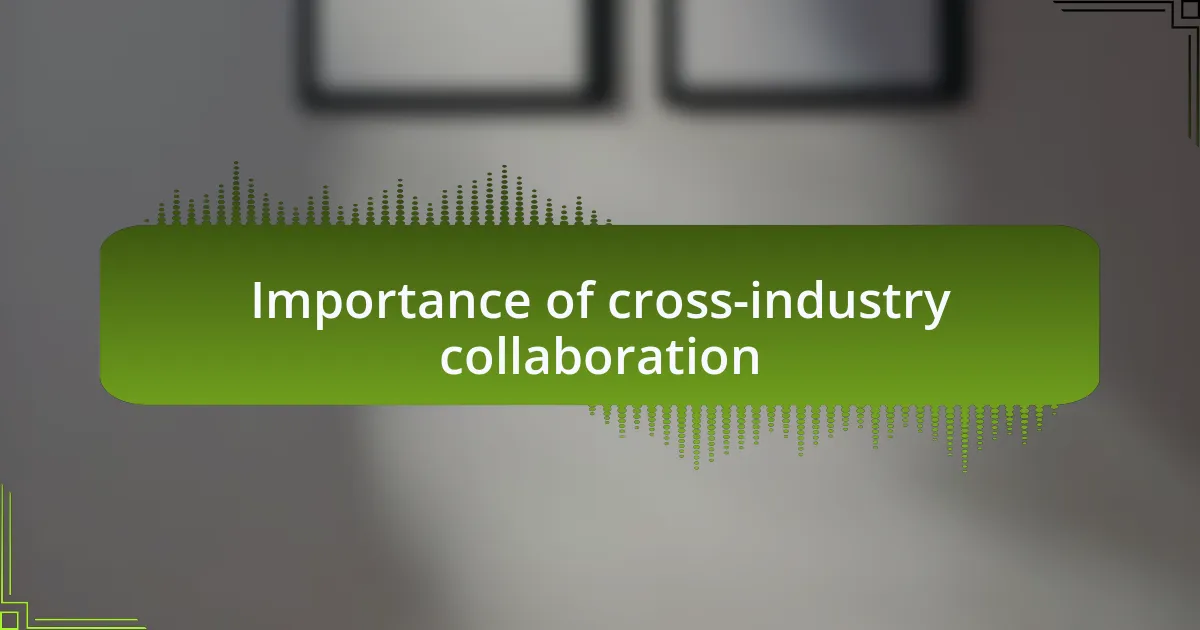
Importance of cross-industry collaboration
Cross-industry collaboration is vital in today’s rapidly evolving landscape. I’ve witnessed firsthand how ideas from different sectors can come together to create something truly extraordinary. For instance, at one workshop, a filmmaker teamed up with a software developer, resulting in an engaging interactive exhibition that neither could have achieved alone. Can you imagine how impactful such synergies can be?
Working across industries also fosters innovation by mixing varied perspectives and skill sets. Reflecting on my experience, I remember brainstorming sessions where professionals from marketing, tech, and design contributed their unique insights. The atmosphere was electric, and it led to the birth of an innovative audiovisual campaign that exceeded all our expectations. Have you ever been part of a situation where collaboration led to a breakthrough idea?
Lastly, collaboration provides a bridge for understanding different challenges and knowledge gaps across industries. I’ve often found that discussing challenges with professionals from unrelated fields opens my eyes to solutions I hadn’t considered before. It reminds me that creativity knows no boundaries and encourages me to think outside my usual parameters. How has cross-industry dialogue reshaped your own approach to problem-solving?
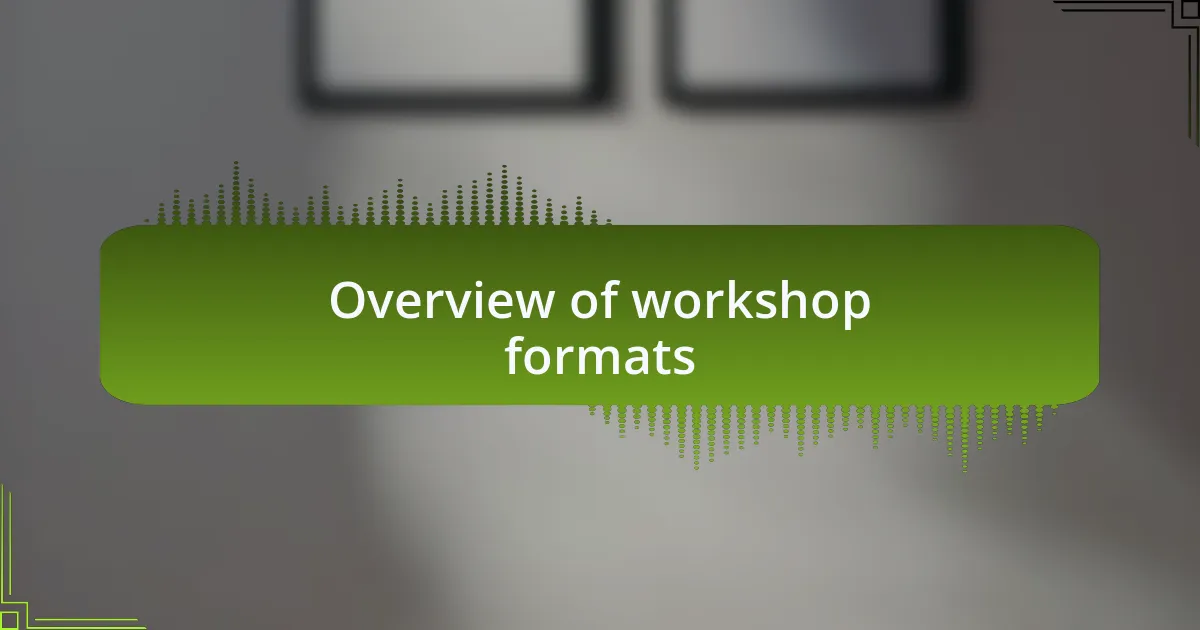
Overview of workshop formats
Workshop formats can vary widely, each with its unique approach to fostering collaboration. For example, I once participated in a design sprint workshop, which emphasized rapid prototyping and iterative feedback. The energy in the room was palpable, as participants rushed to sketch ideas that could evolve within hours rather than days. Have you ever felt that rush of creativity when time is limited?
Another format I’ve enjoyed is the hands-on experiential workshop, where participants dive deep into practical applications. I recall a recent audio production workshop where we were split into small teams, each tasked with creating a short piece. The supportive atmosphere encouraged us to experiment, and it was enlightening to see how different skills could intertwine—even if we initially came from different backgrounds. How do you think hands-on experiences impact learning curves?
Furthermore, I’ve attended panel discussions that showcased diverse expert opinions. Although they follow a more traditional structure, the interaction between the audience and panelists can spark fascinating conversations. I remember a session where an industry leader shared insights that challenged my preconceptions, prompting me to rethink my strategies. Isn’t it amazing how a single conversation can change your perspective?
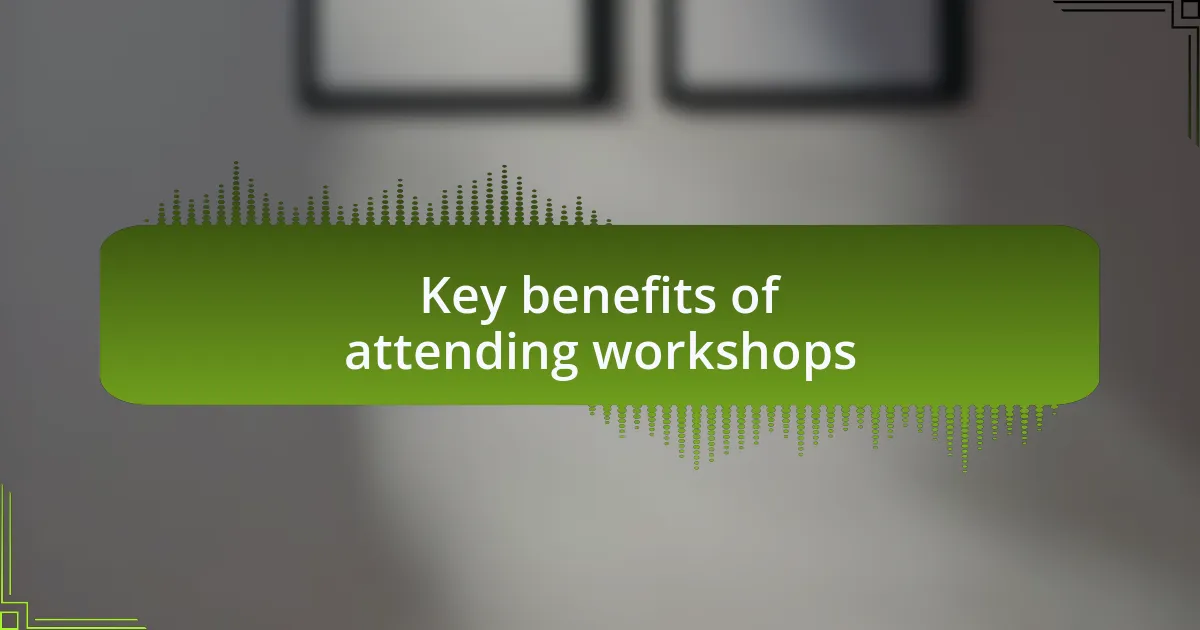
Key benefits of attending workshops
Attending workshops offers an unparalleled opportunity to network with professionals across various fields. I remember a workshop where I met someone who specialized in sound design, a gap I had always wanted to explore. Engaging with such diverse talents not only broadened my perspective but also opened doors for potential collaborations. How often do you find a platform that brings together so many innovative minds?
One of the most significant benefits I experienced is the hands-on learning approach that workshops typically emphasize. I recall an interactive session where we tackled real-world challenges in small groups. The intense focus and direct feedback from facilitators helped me grasp complex concepts in a matter of hours, a feat that traditional classroom settings often struggle to achieve. Have you ever found that immersion leads to deeper understanding?
Lastly, workshops create a safe environment for experimentation and failure, which can be incredibly liberating. During a recent multimedia workshop, I attempted a creative solution that initially flopped. Yet, it was this very failure that sparked a conversation with a fellow participant, leading to an innovative idea neither of us would have considered alone. Isn’t it fascinating how a misstep can shape our learning journey?
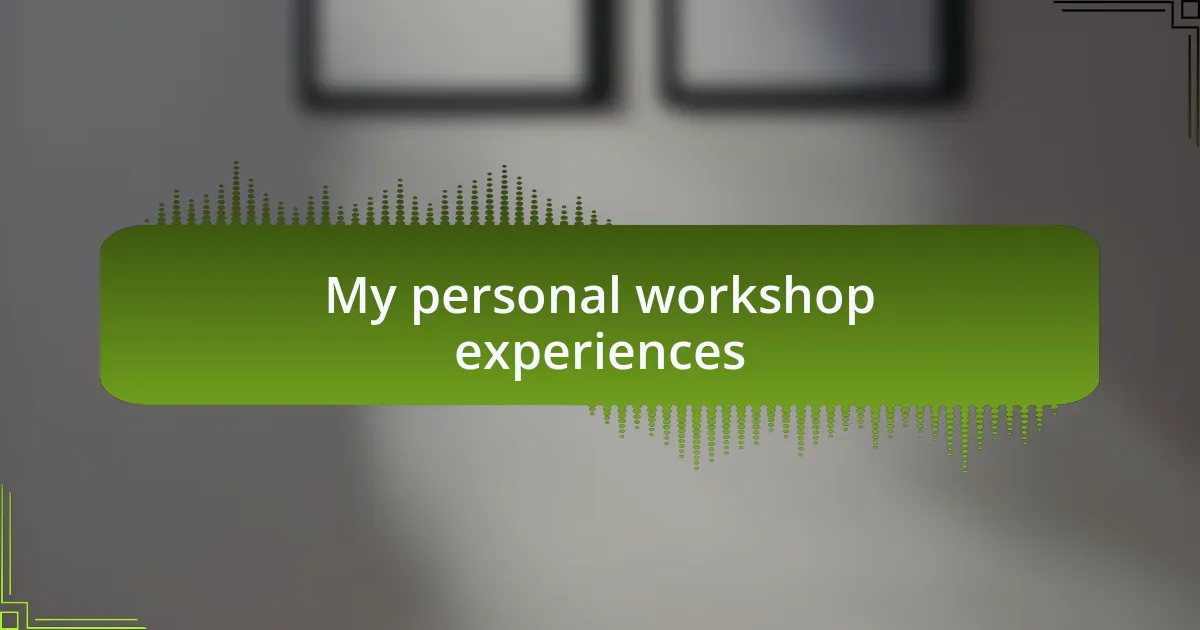
My personal workshop experiences
Participating in workshops has been a transformative experience for me, particularly when it comes to navigating different industries. At one workshop, I was paired with a graphic designer, and we collaborated on a project that blended visual and audio elements. It felt exhilarating to fuse our distinct skill sets, and I walked away with not only new insights but a valuable connection that has turned into a long-lasting friendship.
One particularly memorable workshop involved exploring the latest trends in audiovisual technology. I vividly remember standing behind a camera, trying to master angles and lighting. The facilitator’s passionate guidance ignited my enthusiasm for the craft. Have you ever experienced that moment when everything clicks, and you feel truly inspired? That day, I realized the importance of curiosity—and how workshops can ignite that spark.
I’ve also participated in workshops where vulnerability was encouraged. In one session, we were asked to share our biggest challenges in our projects. I opened up about a struggle I faced with audience engagement, and, surprisingly, it felt cathartic. Hearing similar stories from others reminded me that we’re all on a journey together, navigating our own hurdles. Isn’t it remarkable how sharing our challenges can foster genuine connections and empathy among participants?
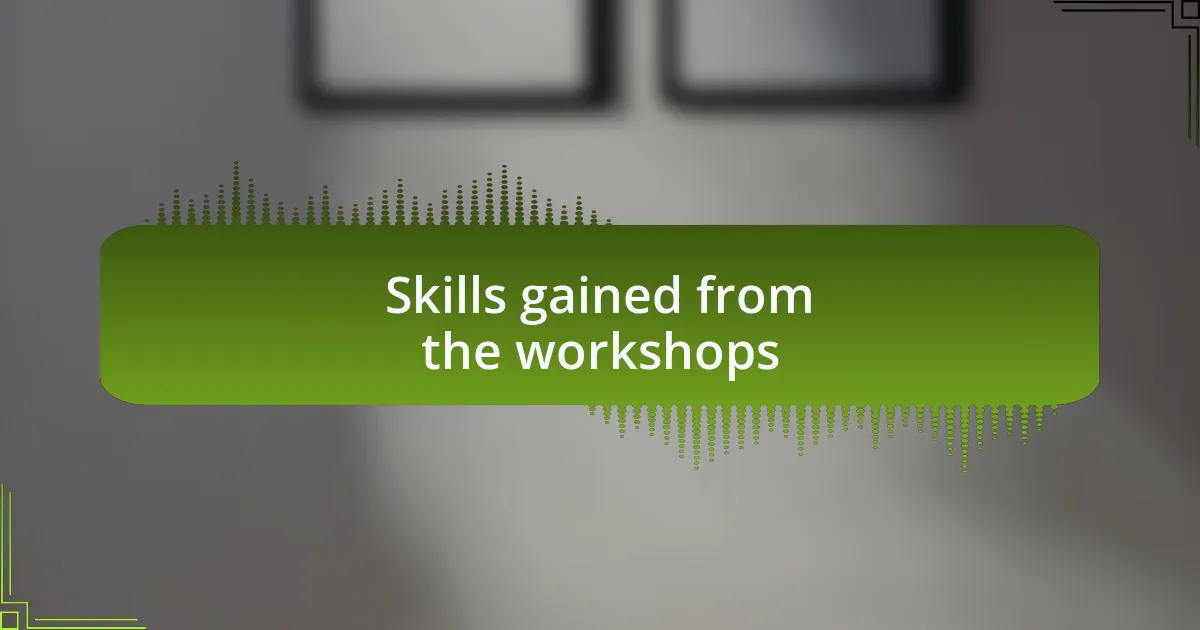
Skills gained from the workshops
One of the most valuable skills I acquired during these workshops was adaptability. In one particular session, we had to switch roles on the fly, which pushed me out of my comfort zone. I never expected to handle sound design, but by the end of the day, I not only managed to contribute but also gained a fresh perspective on storytelling through audio.
Another skill that stood out for me was collaboration. There was a workshop where we formed small groups to brainstorm innovative project ideas. I found that listening to others brought forth ideas I would have never considered on my own. Don’t you find that a simple exchange of thoughts can lead to groundbreaking concepts? This experience reinforced the notion that teamwork truly amplifies creativity.
Lastly, I gained a heightened sense of technical proficiency. Working with new software during these sessions was initially daunting, but I discovered a newfound confidence in my abilities. I remember thinking, “If I can learn this in a matter of hours, imagine what else I could master?” That realization has stayed with me and continuously fuels my desire for self-improvement.
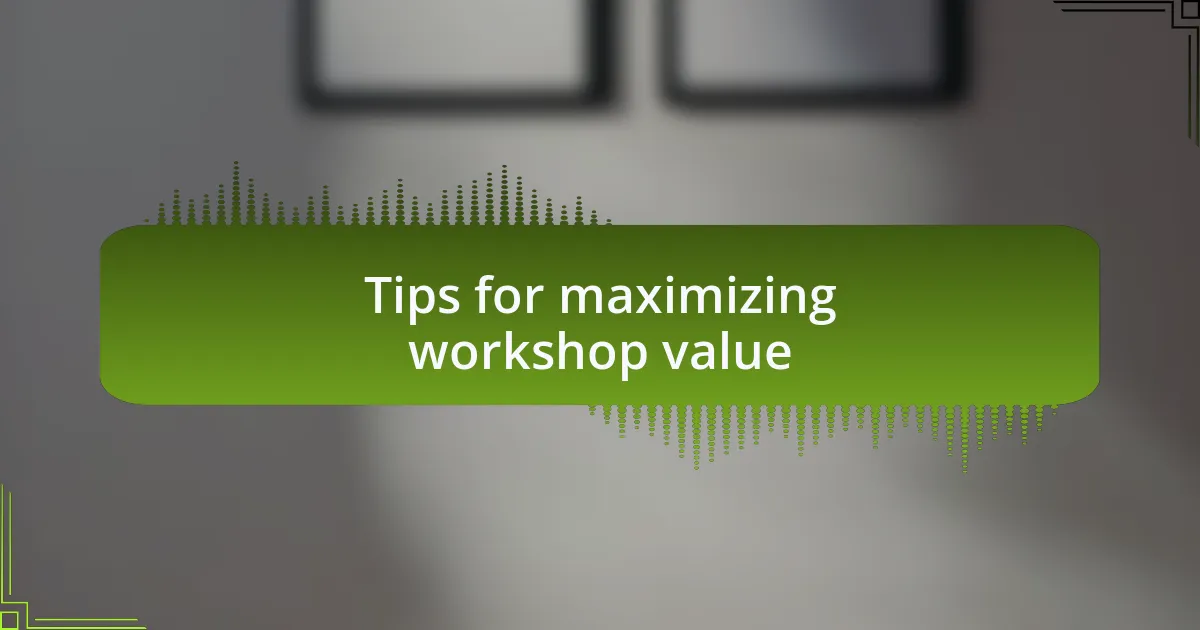
Tips for maximizing workshop value
To truly maximize the value of a workshop, I’ve found that preparation is key. Before attending, I often take a moment to research the facilitators and their areas of expertise. This way, I can tailor my questions to deepen my understanding. Have you ever walked into a session feeling unprepared? It can be overwhelming, but a little effort beforehand makes a world of difference in engaging with the material meaningfully.
During the workshop itself, I’ve learned that active participation is crucial. There was one session where I hesitated to share my thoughts, fearing they weren’t valuable. But when I finally voiced my perspective, it sparked a dynamic conversation that enriched the experience for everyone. Have you ever experienced that moment of hesitation? I encourage you to push through it—your insights could be the catalyst for innovative discussions.
Finally, following up after the workshop is something I highly recommend. I often connect with fellow participants on social media or through professional networks. This practice has led to collaborations I never would have imagined. Reflecting on past workshops, I can confidently say that some of my best projects emerged from these connections. How do you keep the momentum going after an event? For me, nurturing the relationships gained during workshops often leads to unexpected opportunities.